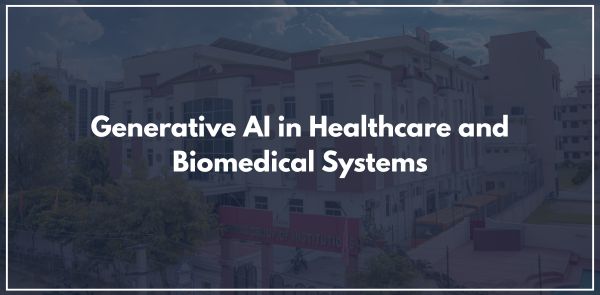
The rapid advancement of Artificial Intelligence (AI) has revolutionized many industries, and healthcare is no exception. Among the most transformative developments in recent years is Generative AI—a subset of AI capable of creating new content such as text, images, proteins, and even entire simulations. In healthcare and biomedical systems, generative AI holds immense potential to reshape diagnostics, drug discovery, personalized treatment, and medical education. This technology is not just augmenting human intelligence—it is redefining the boundaries of what is possible in medicine. Thus, a discussion on Generative AI in healthcare becomes essential. Top BCA colleges across the country incorporate this topic in their curriculum.
Generative AI uses machine learning models, most notably generative adversarial networks (GANs), variational autoencoders (VAEs), and transformer-based models like GPT, to generate new data based on patterns learned from training data. Unlike traditional AI, which is mostly discriminative (identifying or classifying existing data), generative AI creates novel outputs. In the context of healthcare, these outputs can include synthetic medical images, predictive text reports, simulated patients, and even new molecules or protein structures.
One of the most promising applications of generative AI in healthcare is in medical imaging. Radiology, pathology, and dermatology rely heavily on imaging for diagnosis, but these fields often face shortages of skilled professionals. Here is how Generative AI can help in medical imaging and diagnostics:
Traditional drug discovery is a time-consuming and costly process, often taking over a decade and billions of dollars to bring a single drug to market. Generative AI can significantly accelerate this process with the following:
Companies like Insilico Medicine and DeepMind have already demonstrated the power of generative AI in this domain, with AI-designed drugs entering preclinical and clinical trials faster than traditional methods.
Another major benefit of generative AI in healthcare is its ability to personalize treatments. By analyzing a patient’s genetic data, lifestyle, medical history, and real-time health metrics, AI models can perform the following functions:
This approach not only improves treatment outcomes but also minimizes side effects and healthcare costs.
Generative AI is also transforming biomedical research and education with the following applications:
These applications facilitate researchers and educators to work more efficiently and reach broader audiences. With an MCA course in Jaipur, you can learn more about AI and its applications in biomedical research and education.
Despite its promise, the use of generative AI in healthcare raises essential ethical and technical challenges. Here are some of the prominent issues:
To address these challenges, it is crucial to involve multidisciplinary teams, including ethicists, clinicians, and data scientists, in the design and deployment of generative AI systems.
The future of generative AI in healthcare is incredibly promising. As models become more powerful and interpretable and as regulatory frameworks mature, we can expect to see generative AI integrated into routine clinical workflows. From generating real-time diagnostic reports to designing personalized cancer therapies, generative AI will act as a co-pilot to healthcare professionals, enhancing human capabilities rather than replacing them.
Moreover, open-source initiatives and collaborations between academia, healthcare institutions, and the tech industry are accelerating innovation in this space. With proper oversight and ethical deployment, generative AI can play a pivotal role in making healthcare more proactive, precise, and accessible.
Looking to build a career in AI and related technologies? Poddar International College offers a BCA course in Jaipur. This course will help you learn more about artificial intelligence and its applications in various key sectors.